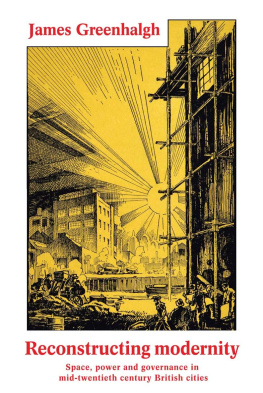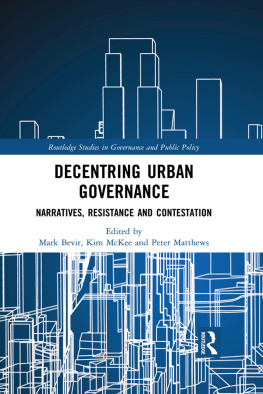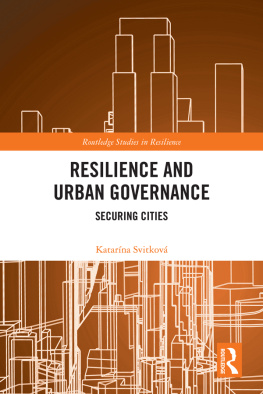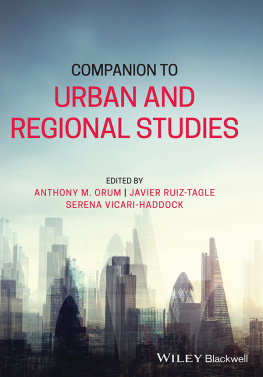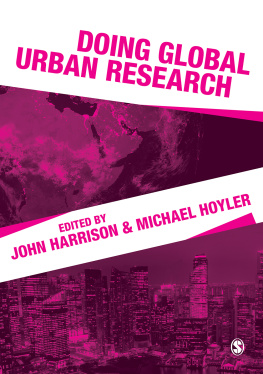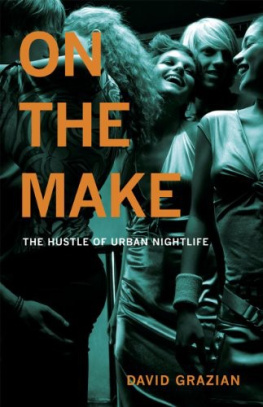
Exploring Nightlife
Exploring Nightlife
Space, Society and Governance
Edited by Jordi Nofre and Adam Eldridge
Published by Rowman & Littlefield International Ltd
Unit A, Whitacre Mews, 26-34 Stannary Street, London SE11 4AB
www.rowmaninternational.com
Rowman & Littlefield International Ltd. is an affiliate of Rowman & Littlefield
4501 Forbes Boulevard, Suite 200, Lanham, Maryland 20706, USA
With additional offices in Boulder, New York, Toronto (Canada), and Plymouth (UK)
www.rowman.com
Selection and editorial matter Jordi Nofre and Adam Eldridge 2018.
Copyright in individual chapters is held by the respective chapter authors.
All rights reserved. No part of this book may be reproduced in any form or by any electronic or mechanical means, including information storage and retrieval systems, without written permission from the publisher, except by a reviewer who may quote passages in a review.
British Library Cataloguing in Publication Data
A catalogue record for this book is available from the British Library
ISBN: HB 978-1-78660-328-9
PB 978-1-78660-329-6
Library of Congress Cataloging-in-Publication Data Available
ISBN: 978-1-78660-328-9 (cloth : alk. paper)
ISBN: 978-1-78660-329-6 (pbk. : alk. paper)
ISBN: 978-1-78660-330-2 (electronic)

The paper used in this publication meets the minimum requirements of American National Standard for Information SciencesPermanence of Paper for Printed Library Materials, ANSI/NISO Z39.48-1992.
Printed in the United States of America
Contents
Adam Eldridge and Jordi Nofre
Chrystel Olouko
Peta Wolifson
Nihad H. engi and Jordi Martn-Daz
Penny-Panagiota Koutrolikou
Atepheh Amid
Jos Snchez Garca
Samantha Wilkinson
Marion Roberts
Daniel Malet Calvo, Joo Carlos Martins and Iigo Snchez-Fuarros
Emanuele Giordano and Dominique Crozat
Irina van Aalst and Ilse van Liempt
Helena Valente, Cristiana Vales Pires and Helena Carvalho
Marcos Paulo Ferreira de Gis
Will Straw
Acknowledgements
We are indebted to a number of friends, colleagues and loved ones for their support and immense patience over the course of compiling this anthology. First and foremost, Martina OSullivan, formerly with Rowman & Littlefield International, responded to our first proposal with nothing less than her complete support and encouragement. In those early stages Martinas help was invaluable. Since then, Michael Watson, Natalie Bolderston and Holly Tyler from Rowman & Littlefield International have been equally encouraging and have lent us their expert advice throughout. Adam would like to say a very special thank you to colleagues in the Department of History, Sociology and Criminology at the University of Westminster, and Jordi would like to thank the Interdisciplinary Centre of Social Sciences from the New University of Lisbon and the Foundation for Science & Technology of Portugal (SFRH/BPD/108458/2015) for their support. Finally, without the commitment and trust of all the contributors this anthology would not have happened, and to them we owe our greatest thanks.
List of Figures
Shaken, Not Stirred: An Introduction to Exploring Nightlife
Adam Eldridge and Jordi Nofre
Thomas Burkes English Night-Life begins with a reflection on the state of British cities after dark. Written in the midst of the Second World War, a picture is drawn of dark empty streets, curfews and blackouts, and a dim, subdued kind of night (1943, 142). According to his extensive review of nocturnal leisure, the past offered ample opportunity for night-time festivities, pleasures and transgressions, and not only for the elite. Like today, various forms of inclusion and exclusion existed, and the night was similarly organised around class, gender and space, but the war led Burke to wonder whether British nightlife would ever quite recover. Two points become clear from Burkes discussion. First, late-night leisure is not new. Van Liempt et al. note that city centres have always had late-night amenities in some form (2015, 411), and, indeed, Amin and Thrift (2002) have argued that a distinctive nightlife emerged sometime in the nineteenth century (see also Erenberg 1984). Koslofskys (2011) Evenings Empire also refers to a nocturnalisation of European cities from the Enlightenment onwards, a period marked by the emergence of street lighting, a new urban culture and expanding opportunities for both work and pleasure after dark. But there is another way of interpreting Burkes commentary. While the conditions under which he was writing are vastly different from today, many contemporary reports of nightlife paint a similar picture, one where all the joy and fun associated with the night has been extinguished or is under threat.
Claims about the imminent collapse of nightlife in London, Sydney, New York or elsewhere are perhaps overstated, but they speak of a similar anxiety about nightlife to that expressed by Burke (1943). This is not an anxiety about crime, danger or antisocial behaviour, though these fears continue to circulate. It is instead a belief that the night and consumers of nightlife need protection. Overzealous authorities who wish to stamp out, over-regulate or control nightlife play an important role in Burkes history as they do in our present. Neighbours complaining about noise from late-night revellers are also not new, as Ekirch (2006) demonstrates. Added to these now-familiar concerns about immorality, noise, crime and disorder, however, new problems have emerged, which equally threaten late-night pleasures: new forms of exclusion, gentrification, commercialisation and mass tourism in particular. Whether these will entirely kill off nightlife is doubtful, but the question as to how we might save nightlife or whether it will ever offer the promises through which it is so commonly understood resonates as much today as it did in the past. How might we make nightlife in our twenty-first-century cities more sustainable, inclusive and secure?
Two questions linger in our minds as we finish this volume: what exactly is under threat here, and why does it matter? Why should we care about the night, least of all nightlife? As night-time scholars, it is perhaps our own failing that these questions have yet to be convincingly answered. Fears about the loss of the night sky due to excessive illumination, the loss of nightlife venues or the muddying of the boundaries that separate night and day (Crary 2013) have become common subjects of debate and tell us as a good deal about what it is we think the night should be and for whom: a time of play, rest, work or darkness are all equally competing discourses about cities after dark. At the very least, as Henckel (2016) has argued, there is little evidence that nightlife even exists beyond a few central streets in most cities, and his own research has found surprisingly little evidence for a clear expansion in night-time employment. As night-time scholars we have perhaps been guilty of assuming that town and city centres in so-called developed Western economies are uniformly open and buzzing twenty-four hours a day and that simply because we can drink, dance or shop at all hours we do so. As Gwiazdzinski suggests, As we advance into the night, the options on offer decrease, and the city shrinks and seems to condense itself into a few clusters of streets where we find concentrations of illumination and animation (2014, n.p.). As Evans (2017) has also suggested, cities often characterised as 24/7 would be more accurately referred to as 24/2. In many cities, it is perhaps true that the night is a time when most people sleep or conduct domestic tasks. The night, as Gwiazdzinski goes on to argue, is expensive, and any sense of social and generational diversity is illusory (2014, n.p.).



 The paper used in this publication meets the minimum requirements of American National Standard for Information SciencesPermanence of Paper for Printed Library Materials, ANSI/NISO Z39.48-1992.
The paper used in this publication meets the minimum requirements of American National Standard for Information SciencesPermanence of Paper for Printed Library Materials, ANSI/NISO Z39.48-1992.
